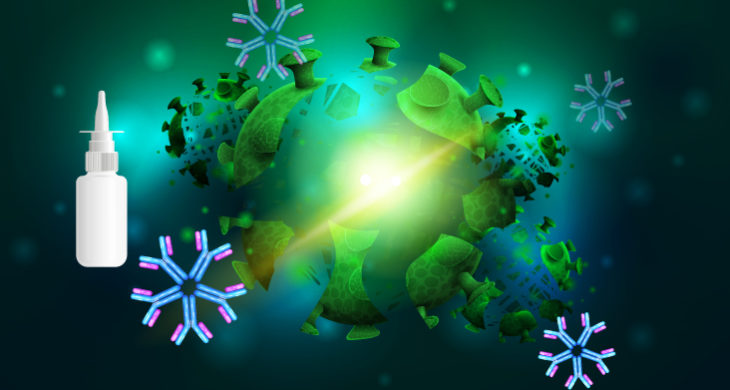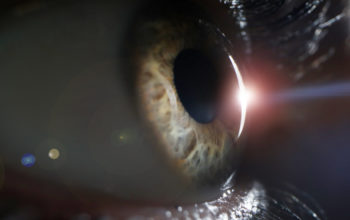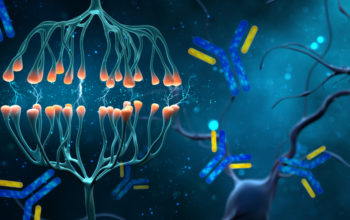
Date: 10th June 2021
The respiratory tract is the major target for SARS-CoV-2 infection, and high viral load in the respiratory system correlates with severe disease in patients. Whilst, almost all currently approved neutralising monoclonal antibodies (mAbs) and those in clinical trials are based on the IgG1 isotype, these may not be the most effective as high serum levels of IgG do not transfer to mucosal compartments. Furthermore, emerging SARS-CoV-2 Variants Of Concern (VOCs) are resistant to several potent neutralising IgG1 mAbs. Now, researchers have designed a hybrid antibody using IgG fragments and mucosal IgM antibodies which were delivered nasally, and gave protection against a broad range of VOCs.
Immunoglobulin G (IgG) is the most abundant type of antibody in the body and protects against viral and bacterial infections however, whilst they relatively slow to appear they are precisely tailored to the invading pathogen. In contrast, IgM and IgA are mucosal antibodies that constitute the first line of defence against mucosal pathogens and IgM is the first to be made by the body. Although, the current Emergency Use Authorization (EUA) COVID-19 antibodies are all IgG antibodies, they have to be administered intravenously at high doses as they don’t directly target the main sites of SARS-CoV-2 infection. Furthermore, the emergence of SARS-CoV-2 variants is a challenge to some of the existing antibodies and resistance to these represents an urgent unmet clinical need for developing alternative resources.
Now, researchers at the University of Texas Health Science Center at Houston, University of Texas Medical Branch and IGM Biosciences Inc led by Zhiqiang An, Bruce Keyt, Ningyan Zhang, Stephen Carroll and Pei-Yong Shi have developed an IgM version of an anti-SARS-CoV-2 IgG monoclonal antibody that upon intranasal administration confers prophylactic and therapeutic efficacy against SARS-CoV-2 in mice.
To start the team performed antibody engineering using six IgG mAbs that had previously been isolated from phage-display library and that recognised different epitopes on the receptor‐binding domain (RBD) of the SARS‐CoV‐2 spike protein. The Fv portion of the IgGs, which maintains the full binding capacity of the intact antibody, were engineered into human IgM or IgA1 scaffolds.
Initial experiments on live SARS-CoV-2 showed that the IgM and IgA1 showed stronger inhibition of the virus that their IgG1 counterparts, and one in particular IgM CoV2-14 (also known as IgM-14 or IGM-6268) was the most potent.
Given IgM-14 showed a strong response to the virus, the team characterised this Ab further. It showed enhanced binding, neutralisation and ACE2-blocking (the SARS-CoV-2 spike glycoprotein binds to angiotensin-converting enzyme 2 on host cells) than its IgG-parental Ab (IgG-14) in cell lines, with a 100-1000x greater neutralising potency.
Recent concerns over newly emerging variants being resistant to approved mAb have arisen. To address this the team assessed the neutralising activities of IgM-14 and IgG-14 against the recently emerged SARS-CoV-2 VOCs. Impressively, IgM was 45-, 547-, and 374-fold more potent than IgG-14 was at neutralising the B.1.1.7 (commonly known as the UK or Kent variant), P.1 (also known as the Brazilian variant) , and B.1.351 (South African) variants, respectively. Further RBD mutants were also created, and the data overall demonstrated that IgM-14 was superior in activity to IgG-14 for viral escape mutations.
Finally, the team wanted to evaluate the protective efficacy of IgM-14 in vivo. IgM antibodies have previously been nebulised and can reach the airway tissues after inhalation so they team delivered IgM-14 intranasally to mice. The found that IgM-14 was enriched in the nasal cavity and lungs up to 168 hours after administration, with other organs and blood showing minimal Ab exposure. Furthermore, IgM-14 conferred prophylactic and therapeutic efficacy against SARS-CoV-2 in mice, and protected against the VOCs tested. For example for the P.1 variant, IgM-14 reduced lung vial loads by 16,429-fold compared to a 4-fold decrease in the IgG-14 treated group.
Conclusions and future applications
The team here have demonstrated that intranasal administration of an engineered IgM can improve efficacy, reduce resistance, and simplify the prophylactic and therapeutic treatment of COVID-19.
The team will be looking to translate the antibody into the clinic, it was well-tolerated in mice and did not appear to have any adverse effects, safety and efficacy will be tested in clinical trials. The antibody has been licensed to biotech partner IGM Biosciences for drug development.
The currently approved COVID-19 Abs are all cumbersome to administer, as intravenous infusion has to be performed by a health care provider, making them harder to access. Intranasal dosing could be a game changer for such drugs, and as IgM Abs are relatively stable, it may be viable to formulate them into a nasal spray that could be bought over the counter at a pharmacy. This type of Ab drug could be seen as an additional safety measure for people exposed to SARS-CoV-2, or as an extra line of defence for those not fully protected by vaccines.
As many countries around the world are fighting second and third waves of COVID-19, the pressure on vaccination programmes is mounting. Whilst, many of the approved and clinical trial COVID-19 vaccines have been shown to be efficacious against variants, newly emerging VOCs are always a concern. Advances such as these, that may reduce the need for expert administration, will be an invaluable tool to fight future waves of infection and allow us move more rapidly into easing of lockdown.
For more information please see the press release at The University of Texas Health Science Center at Houston or at IGM Biosciences
Ku, Z., Xie, X., Hinton, P.R., Liu, X., Ye, X., Muruato, A.E., Ng, D.C., Biswas, S., Zou, J., Liu, Y., et al. (2021). Nasal delivery of an IgM offers broad protection from SARS-CoV-2 variants. Nature.
https://doi.org/10.1038/s41586-021-03673-2


